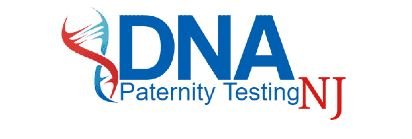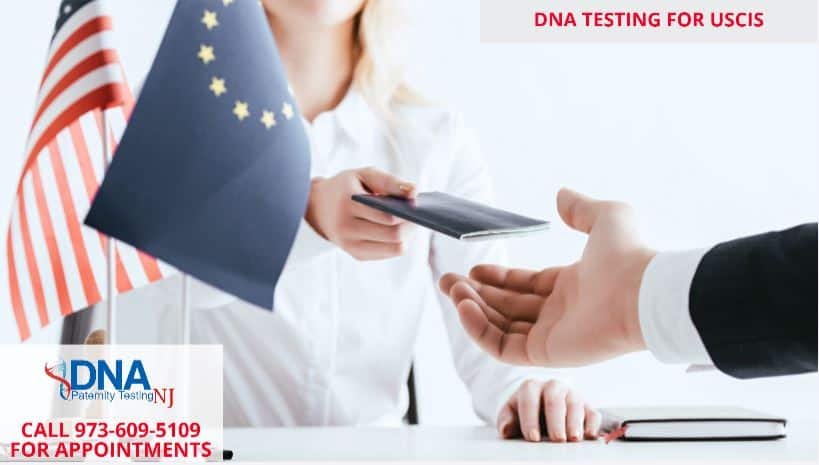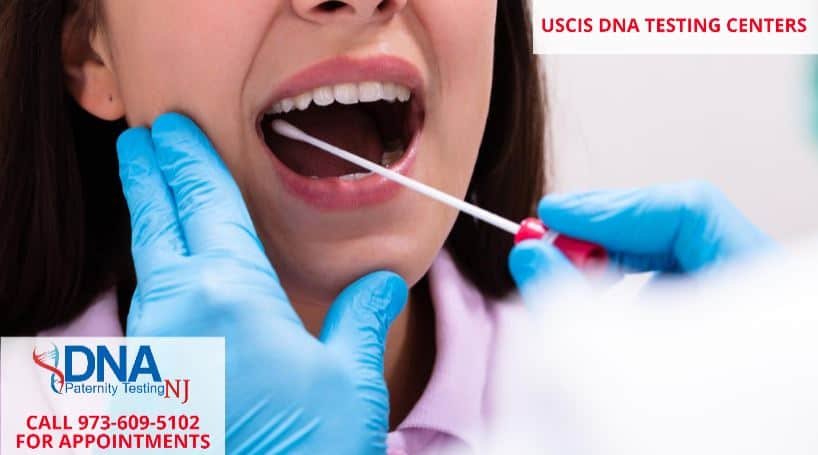

Why did USCIS mail me a Request For Evidence (RFE) letter with DNA Testing option?
When a petitioner receives an RFE letter from USCIS this typically means USCIS has determined that the primary evidence (documents) the petitioner submitted is insufficient, unavailable, or unreliable. The letter you received may provide as one of the options for DNA testing to help prove a biological relationship between parent and child, full-sibling or half-siblingship. It should be noted only labs that are accredited by the AABB can perform DNA testing for immigration purposes.
Please note: All immigration DNA testing services we provide are performed under the strict supervision of a partner AABB accredited laboratory. Currently, USCIS does not currently have the regulatory authority to require DNA testing. This new policy may only suggest DNA testing as an option for proof of relationship.
Getting Started:
1. In order to begin the DNA testing process, USCIS must provide you with the option to perform a DNA test. Performing a DNA test without some form of written request to submit evidence from USCIS may run the risk of having your case denied by USCIS. We recommend contacting our office at 973-609-5102 If you are uncertain about performing a DNA test before receiving your request letter.
2. Once you receive your USCIS request to submit evidence letter normally issued as an I-130 or 797 E letter. Regardless, of the letter type. This letter is the most important letter needed in order to begin the DNA testing process.
3. Contact our office to coordinate an appointment today at 973-609-5102.
4. Please make sure you walk with a state-issued ID (Passport, State ID or, Drivers License)
5. Once your samples are collected. The DNA samples will be shipped to the laboratory to be processed and analyzed.
6. Once all samples arrive at the DNA lab. The turnaround time for results to be completed is 2-3 business days.
7. Upon completion of your DNA test result, you will be notified of the completion of your result and copy will be mailed out to your home.
Frequently Asked Questions
The turnaround time for results will be predicated on whether all parties reside in the U.S. or If one or more parties live abroad. Petitioners who live in the U.S. and have a family member in another country. The turnaround time for completion on average is 6-8 weeks, sometimes longer.
If all parties reside in the U.S. as stated earlier, The average turnaround time 2-3 business days from the date the lab receives all of your DNA samples.
Currently, DNA testing is a suggested option provided by immigration. It is not deemed a requirement. Although this may change in the near future.
If you are in need of a knowledgeable and reliable source of DNA relationship testing services. Please do not hesitate to contact our office today at 973-609-5102 to get started today.
DNA testing for immigration purposes can be used when USCIS, a U.S. Embassy, or a U.S. Passport Agency believe your family did not provide sufficient primary evidence to prove a biological relationship. If this is the case the requesting immigration will issue a Request for Evidence (RFE) providing your family a voluntary option to perform DNA testing.
Only laboratories that are accredited by the AABB can perform DNA testing services that will be recognized by USCIS or U.S. Embassies. This is why we partnered are partnered with facilities that are accredited by the AABB to ensure our clients remain compliant with immigration guidelines for evidence submission. If you are in need of immigration DNA testing services. Please do not hesitate to contact our office today at 973-609-5102 to get started.
Today, the most commonly used method of collecting DNA samples is by buccal swab. The cotton buccal swabs are placed inside of the mouth and are rubbed against your cheek gently. Blood sample collections are still an acceptable option. Please note, the accuracy between buccal swab samples and blood samples is similar.
The most commonly used relationship tests a USCIS, U.S. Embassy or, U.S. Consulate may ask your family to provide additional secondary evidence are for paternity (father and child), maternity (mother and child), or siblingship (brother and sister, sister and sister or, brother and brother).
